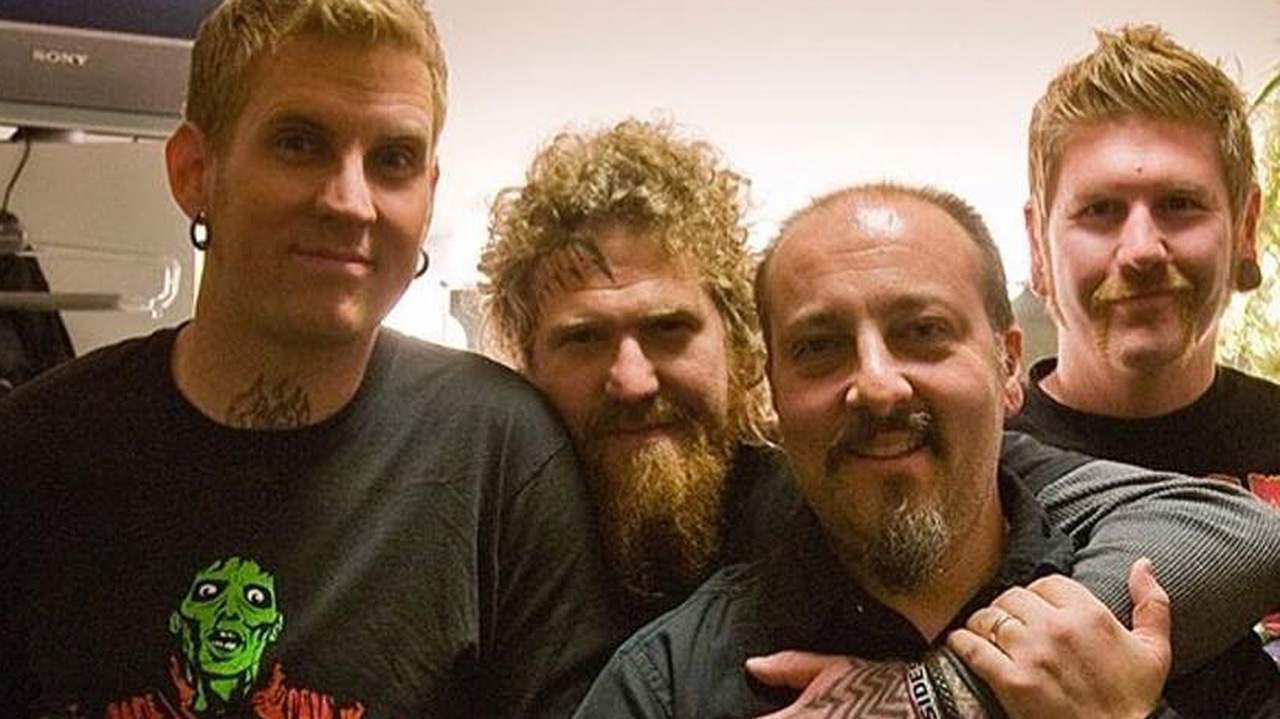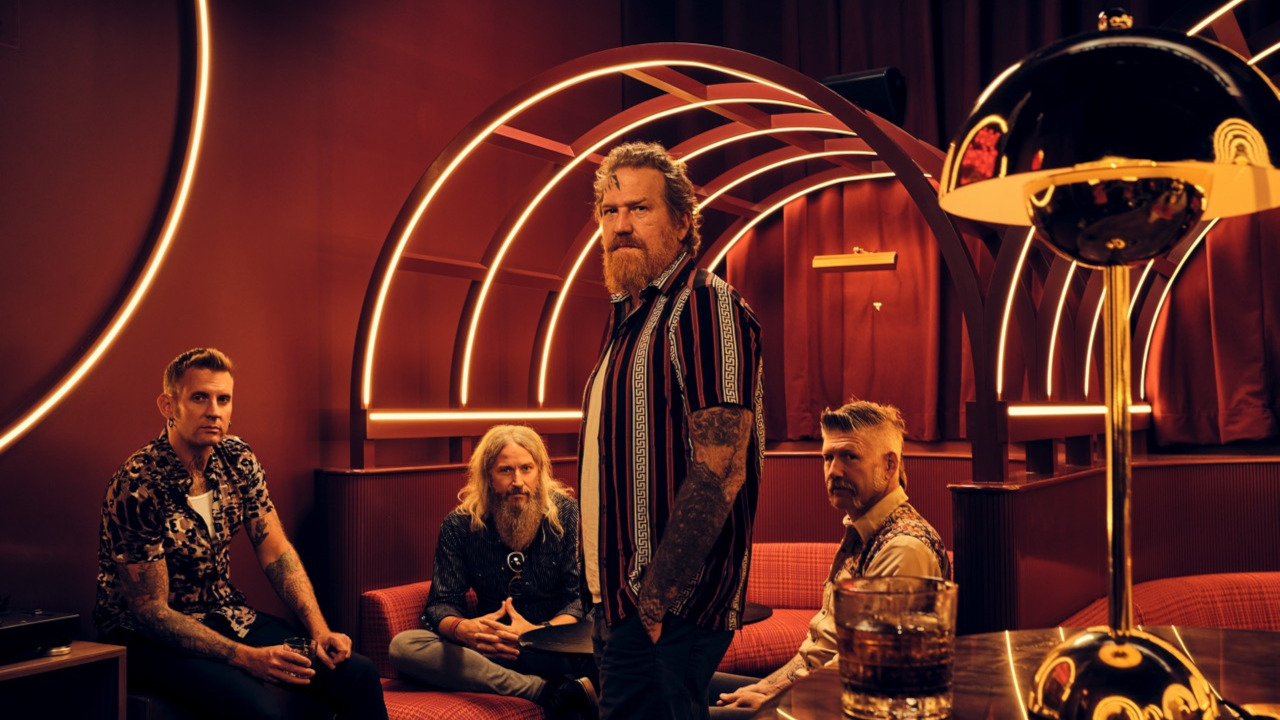Mastodon's Brann Dailor felt nervous as he pressed the phone to his ear. It was 2004, and he’d spent the last few weeks talking to potential managers ahead of the release of his band's second album Leviathan. But all of them had been too slick, too LA, too busy looking around the corner for the next best thing to come along.
Nick John was different. Part of Rick Sales Entertainment Group, which managed the legendary Slayer, he’d extended the hand of friendship after Brann had got his number from a mutual friend and cold-called to ask for hiring advice. They’d spoken eight times since, getting on like a house on fire. Nick’s storied insight would be useful, Brann reasoned, but because he had Tom Araya and co on the books, he wouldn’t be interested in taking on Mastodon. Now, Brann was about to ask him to do exactly that.
“I told the band I was gonna pop the question,” he quips, speaking via Zoom from Atlanta. “I was nervous, because I’m afraid of rejection, like most human beings. I waited nine dates to ask!”
Nick agreed immediately, and met Mastodon on July 23, the day they played New Jersey’s Hellfest. Driving together in a minivan, they talked, and talked, and talked about the band’s hopes for the future. The afternoon the band signed with him, they landed the Slipknot/Slayer Unholy Alliance tour in Europe and the UK. “We were off to the races,” smiles Brann.
Giving feedback on their riffs, gossiping about Slayer, and bringing his warmth, enthusiasm and dry humour to their day-to-day lives, Nick became Mastodon’s constant companion and champion. Every time the Atlantans had a new demo or finished masters for an album, Nick and his wife Colleen would head to their living room, crack open a bottle of wine and blast it as loud as it would go. He shared in Mastodon’s successes, and they brought him joy. “He was a big cheerleader for us,” says Brann. “Our trust in him was marrow-deep.”
So in January 2018, when Nick told the band he was unable to attend the Grammys – they’d been nominated for Best Metal Performance for seventh album Emperor Of Sand – they knew something was seriously wrong. Although he’d been ill and having tests, he wouldn’t tell them his diagnosis for another few months – but Brann had a lurching, instinctive realisation: “He has cancer.”
"We all guard ourselves from having to confront the spectre of death; you just sidestep it."
Brann Dailor
He was right. Nick had pancreatic cancer. Yet Brann remained positive, refusing to acknowledge that the worst could happen, and giving his buddy the encouragement he needed. “You don’t believe there’s any chance it will actually end in the person dying, which is a good attitude,” he affirms. “And that’s how we all guard ourselves from having to confront the spectre of death; you just sidestep it.”
The pair were in touch a lot, texting rather than calling because Nick couldn’t use his vocal cords. That was disturbing enough for Brann, but as Nick sent through photos from chemo, he had an inkling things were getting rough. When he visited him on July 4, 2018, while on tour with Primus, all optimism dissolved. “I had never seen anyone so sick,” he remembers. “It blew me away. After seeing him that day, I emerged with this feeling of dread. I was thinking to myself, ‘I don’t know how someone comes back from being as sick as he is right now.’”
Bassist Troy Sanders was at his son’s baseball practice when he got the call that Nick had passed away. It was Saturday September 8, 2018, Troy’s birthday. And although the news was utterly devastating, it was not unexpected.
A week earlier, management had cancelled Mastodon’s North American tour with Dinosaur Jr. and suggested they fly to Nick’s bedside to say their farewells. The cancer had weakened him greatly and he was passing in and out of consciousness, so there, inside his quiet house, they told him they loved him and offered reassurance.
“It was the worst thing I’ve ever seen in my life. I’d never been in someone’s presence when they were in that physical state of near nothingness,” says Troy, via videocall from his study. “He kept saying he was sorry this was happening, because he felt like he was burdening us. We were like, ‘No, we’re sorry this is happening. You’re in terrific pain, close your eyes and sleep, you’re the best.”

Mastodon are no strangers to loss. In 2009 they released Crack The Skye, a heartfelt tribute to Brann’s sister Skye, who died by suicide when they were kids; 2011’s The Hunter honoured guitarist Brent Hinds’ brother, who passed away on a hunting trip; while making 2018’s Emperor Of Sand, guitarist Bill Kelliher’s mother passed away from cancer. But this was the first time Troy had experienced the death of someone close, and after writing lyrics for Mastodon’s eighth album – which would eventually be titled Hushed And Grim, and sprawl to double length – he was hit with a startling realisation.
“All my lyrics were part of the Stages Of Grief, that I didn’t recognise until it was all done,” he says. “It started out with layers of anger and frustration; I was so mad that something so horrific could take something so beautiful.”
One of the first songs they wrote was The Crux, an urgent, tense affair that gives way to a question: ‘Underneath a cloud of silence, you journey into the rift / Will time defy the weight of you leaving us.’ Another was Sickle And Peace, with its dramatic chorus about the horror and grace of the inevitable: ‘Death comes and brings with him sickle and peace / Shelter from storms comes with long flowing robes.’ Heartrending and intimate, the record bows under the weight of grief, with imagery of ash, and of clawing, scraping and washing away – yet it also elevates Nick and his legacy.
One night, towards the end of 2020, Troy was walking on the beach near his home in Florida when he felt something inside him shift. “For the first time, a positive feeling washed over me of, ‘Wow, I’m so glad that our relationship happened.’ It’s horrible that he’s gone and I’m still here, but I felt the completeness of being touched by his amazingness.”
To honour these feelings, he wrote the shining, comforting Skeleton Of Splendour, telling Nick: ‘Now you sleep, we’ll finish your work.’ “It was almost like a letter of thanks to him,” explains Troy. “It hit me how important it was that I had come full circle with these emotions.”
- Every Mastdon album ranked from worst to best
- The 10 albums that changed Troy Sanders' life
- 10 essential prog metal records
- The 10 greatest drummers of all time, according to Gojira's Mario Duplantier
Brann was getting a haircut in early 2020 when he realised he was having a panic attack. “I was sitting there freaking out,” he recalls. “I was thinking, ‘How fucking bizarre would it be if I just got up and walked out of here?’ Because that’s what I felt like doing. But I sat there and went through it, and the lady had no idea. I wasn’t showing signs of anything.”
"Maybe down the road this record will help somebody out of a tough situation, and then it’ll be worth it.”
Brann Dailor
It was right before the pandemic, and as well as grieving for Nick, he was grappling with issues regarding his mum and some of his closest relationships. In the words of contemporary trauma research, the body keeps the score. “I was so stressed out at that period of time,” he remembers. “That’s when I started drawing my clowns.”
His daily clown drawings, which we reported on in Metal Hammer 338, were art therapy; a way of expressing hopes and fears, and of focusing his mind on a recurring, absorbing task to stop it wandering into darkness. And when Brann came to pen his lyrics for Hushed And Grim, he channelled everything he was experiencing: the complex gutpunch of loss, panicky feelings of isolation and desperation, extreme mental exhaustion, and uncertainty about the future and if things would ever return to normal.
Without the cover of a big, fantastical concept, such as Crack The Skye’s Rasputin story, the evil Emperor Of Sand, or the appearance of mythical monsters, Hushed And Grim includes some of Brann’s most raw and intimate lyrics yet. Pushing The Tides is a visceral response to his panic attacks, while one particularly poignant line of More Than I Could Chew asks: ‘Will there ever be a place that I can hide and heal these open sores / Or do I have to cut them out and eat them as my people adore.’ He is referring to interviews like this, and to the stage; spaces that require him to rehash his pain.
“There’s a part of me that gives too much,” he admits. “But I can’t help it. I’m a people-pleaser, so it’s my own fault. But the only way I can understand what happened to me is to write about it in the music.”
Is it worth it?
“I don’t know that it is. Maybe it is,” he considers. “I think that’s something that reveals itself later. I did that with Crack The Skye. I’ll tell you what, nobody in my family wants to talk about that ever, at all. Not that they want to forget about her, but it’s too painful. So they’re like, ‘Nope! Pass the mashed potatoes!’ But there I was, opening myself up to questions. No lie, an interviewer got on the phone with me, and his first question, right out of the gate, was: ‘So, your sister committed suicide. Let’s talk about that.’ I was like, ‘Holy shit.’”
Since opening up about Skye’s death, though, he’s received messages from grateful fans who have felt less alone in their hurt. “There’s always the hope that you’re helping somebody. So maybe down the road this record will help somebody out of a tough situation, and then it’ll be worth it.”
Hushed And Grim might not have a grand, theatrical concept, but it does have a more subtle one that ties into the artwork: when you die, your soul goes into the heart of a tree, where it goes through the four seasons. You see your life as a movie highlights reel that shows the ups and the downs – and then you say goodbye.
It’s not something that Brann believes in, though. He was only 15 when Skye died, and found himself asking questions: What happens at an autopsy? What did she go through? But it makes for a soothing alternative afterlife mythology. “Nobody’s comfortable with me telling them that the lights just go off, and it’s like your deepest, dreamless sleep,” Brann notes wryly. “There’s no fun in that.”
The album’s sleeve, by longtime collaborator Paul Romano, features a mighty, sturdy specimen of a tree with Nick John at the base, depicted as the Green Man. His wife, Colleen, has given her approval, and the band kept her in the loop throughout the making of the record. Although their biggest cheerleader will never know what they’ve created in his name, Brann’s sure he’d approve, too. “I feel like he’d be so proud of us,” he says. “There’s a lot on here that he’d be flipping out about.”
“I wanted to run, get away from everything, and pretend none of it was happening."
Brann Dailor
One of those things is Soundgarden guitarist Kim Thayil’s solo on the lighter-waving, grunge-inflected slowie Had It All – “he’d be blown away,” smiles Brann. It’s also a song Troy loves deeply; he composed it on an acoustic guitar, and asked his mum to play the French horn on it. “She had never been in a proper recording studio before. She’s always played church functions, and in orchestras, so the whole experience was a bit mind-blowing for her,” he smiles.
But perhaps the most moving song is album closer Gigantium. After 80 minutes marking life’s bittersweet qualities, it’s a slow-motion cry of anguish, followed by a monument of love to Nick John. The first section transpired when Brann was in the thick of emotional torment and living at the band’s West End Sound studio; their engineer, Tom Tapley, knew what he was going through and offered to come by and demo some material with him. “They were pretty raw moments for me,” he remembers. “I wanted to run, get away from everything, and pretend none of it was happening.”
The second part came a few months later, its uplifting, hymn-like, string-augmented composition sending shivers down the spine. “I love the last line: ‘The mountains we made in the distance will stay with us.’ It’s basically telling Nick that everything we did together still exists, and always will,” explains Brann. “And I love that ending riff and guitar solo; it feels like you’re driving a car on a long desert road that just goes on, and on, and on. Yeah it’s sad, but it’s gonna be OK. There’s some resolve there.”
Hushed And Grim is a long listen. Difficult to wrap your head around in the first instance, at times uncomfortably naked, but undoubtedly the most mature and fully realised album Mastodon have produced in their 21-year career. By the time you get to the end, your chest heavy with vicarious heartache, you could be forgiven for thinking: is it really better to have loved and lost, than to have never loved at all?
“Undoubtedly yes,” replies Troy. “In life, and after his death, Nick’s continued to make me a better person. It makes that gift of life fuller, that I am able to continue, and musically reflect and give back the greatness he’s touched me with.”
“Of course,” shoots back Brann. “It hurts so much because you cared so much about that person while they were here. You wouldn’t trade those memories for anything in the world.”
Hushed And Grim is out on October 29 via Reprise

